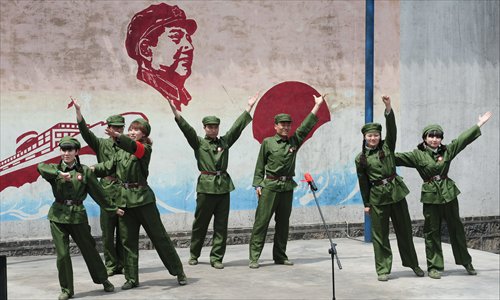New 'class struggle'
Think tank signals resurgence of Marxist thought to drive policy reform

Actors stage a Red Guard performance set during the Cultural Revolution (1966-76) in Jinan, Shandong Province on April 28. Despite the lingering painful memories of the chaotic era, some of its more symbolic elements continue to draw attention today. Photo: CFP
Recent moves by the Chinese Academy of Social Sciences (CASS), one of the most prominent State-run think tanks in China, generated widespread speculation when CASS President Wang Weiguang wrote in the Party-run journal Hongqi Wengao (Red Flag Manuscript) that "class struggle would never disappear in China."
It was the use of "class struggle" that caught media attention; a phrase steeped in the tensions that triggered the havoc of the Cultural Revolution (1967-76), when national leaders called on the masses to eradicate the "class enemies" who sought to draw China into capitalism.
Wang said the struggle between capitalist and socialist forces still exists in China, a comment that begged the question from observers: Is class struggle back on the political agenda?
As China began opening its doors in 1978, rhetoric involving class struggle changed. Then-leader Deng Xiaoping said that class struggle was not a "main social conflict" and it should not be "exaggerated."
The Party Constitution also warns that while class struggle may ignite once again, it should not be a main concern for Chinese society.
Many dismissed Wang's article as inflammatory.
Nevertheless, the statement aroused concerns that conservative ideologies are gaining momentum at CASS, an academic institution instrumental in shaping China's policy.
Ideology intensified
Though Wang did not clarify who the "class enemies" are, he wrote that China should exercise dictatorship over those who attempt to Westernize and capitalize China.
Wang, a Marxist expert, has repeatedly asserted that Marxism should be the leading ideology in China and scholars should be vigilant against Western ideologies like "constitutional democracy" and "universal values."
In a speech he gave on August 26, Wang said that CASS is not a group of freelancers who can write whatever they want. Rather, it is an important academic organization that promotes the ideologies of the Communist Party of China (CPC).
Earlier in July, CASS's deputy president Zhao Shengjun revealed that CASS highly values its ideological work and holds political discipline as one of its primary assessment standards.
According to Zhao, political responsibility can make or break a candidate or potential project, as it plays a vital role in the approval of research projects, grants and promotion.
In addition to linking academic evaluation with ideology, CASS analyzes and criticizes Western ideals, including civil society and neo-liberalism through lectures, books and articles.
Between December 2013 and June 1, 2014, a total 220 officials and research fellows at CASS underwent Marxism training, the largest and longest training program in the academy's history, the People's Daily reported.
An urban planning research fellow at CASS told the Global Times that he had taken such courses and attended forums over the past 10 months.
"All of those ideological activities have been emphasized more this year," the scholar said, requesting anonymity.
He said that while Marxism forums are held every year, this time around everyone was required to join.
"Now it is more like an assignment that every institute has to ensure a certain number of participants."
According to the CASS website, 34 out of 165 articles tagged "leadership remarks" in last eight months laud Marxism while only six push for economic reform. More than one fifth of the 405 stories under the heading "important news" are about holding Marxism forums, lectures, recruiting new research fellows and sharing in Marxism research.
Questions raised
In June, Zhang Yingwei, a senior discipline inspector with the Central Commission for Discipline Inspection (CCDI) stationed at CASS, claimed that the academic institute has "ideological problems," such as conducting "illegal collusion" during politically sensitive times and receiving peer-to-peer infiltration from foreign forces.
Many speculated the CCDI criticisms were rooted in the recent resurgence of Marxism.
"Amid the proliferating ideologies and thoughts, some of which are not harmonious or beneficial to social stability, people should not be surprised if CASS feels the need to strengthen ideological awareness and also remind the public of the leading role of Marxism," Yang Xiannong, a professor of Marxism at the Sichuan Academy of Social Sciences in Chengdu, told the Global Times.
"Corruption, violent demolitions and other clashes between people and local governments have led some to become activists who have transferred their hatred for local governments to China's current system and chosen path, creating ideological challenges to CPC leadership and political stability," said Fang Ning, director of the Political Science Institute at CASS.
"Marxism constitutes the fundamentals and is the source of legality of CPC leadership and should be emphasized to maintain stability," Wang Zhanyang, a scholar at the Central Institute of Socialism in Beijing, told the Global Times. The concern is, Wang said, that Marxism would be overly used to defend interest groups.
Some also expressed concerns that the trend would encourage another revolution, said Huang Weiping, a politics professor with Shenzhen University.
But Yin Yungong, an expert on the socialist system at CASS, argued that liberal experts and college professors are responsible for spreading Western political theories unfit for China that may shake social stability.
"Authorities have taken note of this dangerous trend and academics should be shifted back onto the right track," he added.
Tong Zhiwei, a political science professor at the East China University of Political Science and Law, expressed concern that too much emphasis on ideology could distract research fellows from academic work.
"Gradually research fellows will lose the courage to be creative and will not be independent," Tong said.
The focus of the top academic institution affects other academic institutions and colleges, Huang added.
In early September, three of China's most prestigious universities, Peking University, Fudan University and Sun Yat-sen University vowed to strengthen ideological work among students and teachers under new historical conditions. The statements were published in Qiushi, a Party-run journal.